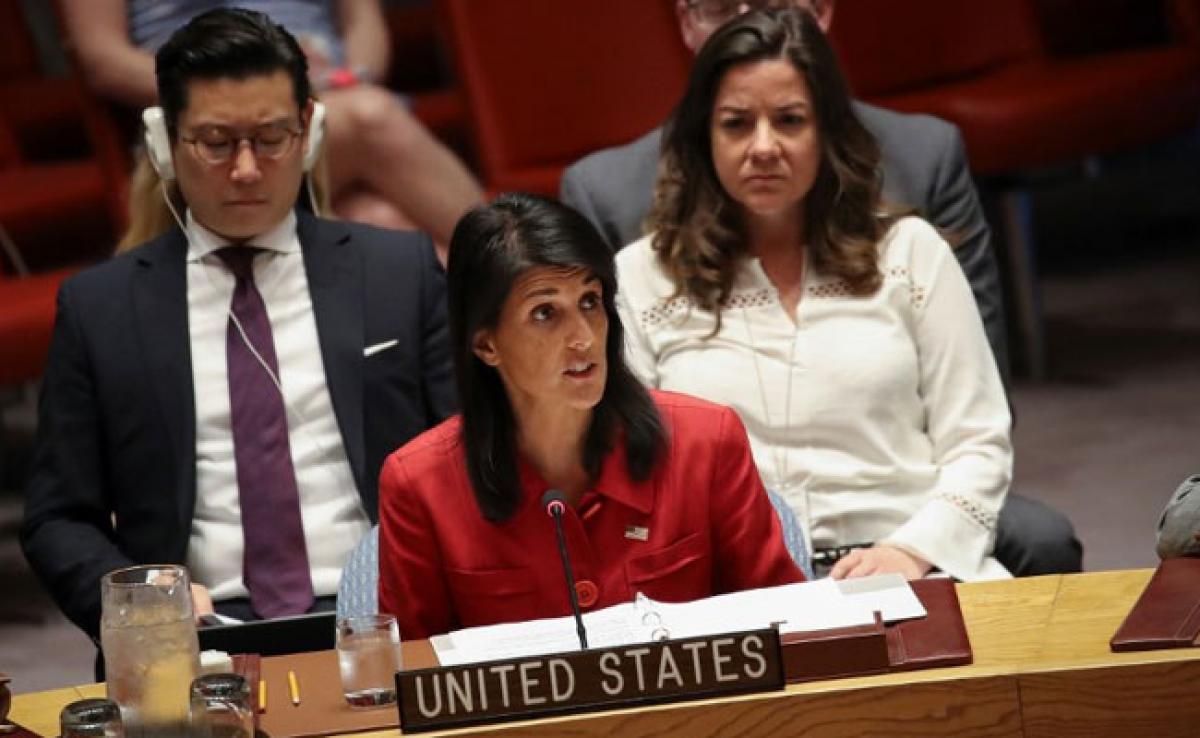Live
- Delhi Mayor poll: Cross-voting shows AAP councillors’ frustration, says Congress leader Jitender Kochar
- NIA files fresh charges against Mizoram-based arms trafficker
- From appeasement to 'New India' pitch: Nadda credits PM Modi for changing style of politics
- Bihar liquor ban gave rise to unauthorised trade, means ‘big money’ for officials: Patna HC
- COP29 Presidency launches initiative to address climate change, humanitarian needs
- Bangladesh's October foreign reserves fall below 20 billion USD
- CM Vijayan's top aide Sasi takes legal route in fight with MLA Anvar
- Dhirendra Shastri supports Yogi Adityanath's 'batenge to katenge' slogan
- Top 10 Most-Watched OTT Releases of the Week (Nov 4-10)
- Istanbul nabs over 240 illegal migrants
Just In

The United States cautioned on Wednesday it was ready to use force if need be to stop North Korea\'s nuclear missile programme but said it preferred global diplomatic action against Pyongyang for defying world powers by test launching a ballistic missile that could hit Alaska.
The United States cautioned on Wednesday it was ready to use force if need be to stop North Korea's nuclear missile programme but said it preferred global diplomatic action against Pyongyang for defying world powers by test launching a ballistic missile that could hit Alaska.
US Ambassador to the United Nations Nikki Haley told an emergency meeting of the UN Security Council that North Korea's actions were "quickly closing off the possibility of a diplomatic solution" and the United States was prepared to defend itself and its allies.
"One of our capabilities lies with our considerable military forces. We will use them if we must, but we prefer not to have to go in that direction," Haley said.
Taking a major step in its missile programme, North Korea on Tuesday test launched an intercontinental ballistic missile that some experts believe has the range to reach the U.S. states of Alaska and Hawaii and perhaps the US Pacific Northwest.
North Korea says the missile could carry a large nuclear warhead.
The missile test is a direct challenge to US President Donald Trump who has vowed to prevent North Korea from being able to hit the United States with a nuclear missile.
He has been urging China, North Korea's main trading partner and only major ally, to press Pyongyang to give up its nuclear programme.
Haley said the United States would propose new UN. sanctions on North Korea in coming days and warned that Washington was prepared to cut off trade with countries that were doing business with North Korea in violation of UN resolutions.
"Much of the burden of enforcing UN sanctions rests with China," Haley said. "We will work with China, we will work with any and every country that believes in peace. But we will not repeat the inadequate approaches of the past that have brought us to this dark day."
Diplomats say Beijing has not been fully enforcing existing international sanctions on its neighbour and has resisted tougher measures, such as an oil embargo, bans on the North Korean airline and guest workers, and measures against Chinese banks and other firms doing business with the North.
Tensions With US
The United States has remained technically at war with North Korea since the 1950-53 Korean conflict ended in an armistice rather than a peace treaty and the past six decades have been punctuated by periodic rises in antagonism and rhetoric that have always stopped short of a resumption of active hostilities.
Tensions have risen sharply in recent months after North Korea conducted two nuclear weapons tests last year and carried out a steady stream of ballistic missile tests
North Korean leader Kim Jong Un said the ICBM test completed his country's strategic weapons capability that includes atomic and hydrogen bombs, the state KCNA news agency said.
Pyongyang will not negotiate with the United States to give up those weapons until Washington abandons its hostile policy against the North, KCNA quoted Kim as saying.
"He, with a broad smile on his face, told officials, scientists and technicians that the U.S. would be displeased ... as it was given a 'package of gifts' on its 'Independence Day'," KCNA said, referring to the missile launch on July 4.
The US military assured Americans on Wednesday that it was capable of defending the United States against a North Korean ICBM.
Pentagon spokesman Navy Captain Jeff Davis noted a successful test last month in which a US- based missile interceptor knocked down a simulated incoming North Korean ICBM.
"So we do have confidence in our ability to defend against the limited threat, the nascent threat that is there," he told reporters. He acknowledged though that previous US missile defence tests had shown "mixed results."
The North Korean launch this week was both earlier and "far more successful than expected," said US.-based missile expert John Schilling, a contributor to Washington-based North Korea monitoring project 38 North.
It would now probably only be a year or two before a North Korean ICBM achieved "minimal operational capability," he added.
Schilling said the US national missile defence system was "only minimally operational" and would take more than two years to upgrade to provide more reliable defence.

© 2024 Hyderabad Media House Limited/The Hans India. All rights reserved. Powered by hocalwire.com







